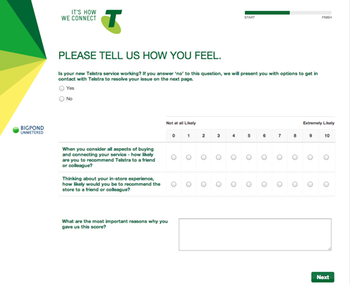 With all their constant worrying about whether people would recommend them or not, like this example from Telstra, I’m starting to think that most big corporations are paranoid psychotics — and not in a good way.
With all their constant worrying about whether people would recommend them or not, like this example from Telstra, I’m starting to think that most big corporations are paranoid psychotics — and not in a good way.
The other day I conducted a perfectly routine transaction at a Telstra Shop. I cancelled a mobile broadband service and replaced it with a different one. As with many businesses, my visit was followed up with a brief survey, “Please tell us how you feel.”
There were four questions, but none of them actually asked me how I felt:
Is your new Telstra service working? If you answer ‘no’ to this question, we will present you with options to get in contact with Telstra to resolve your issue on the next page.
OK, that’s fair enough. You need to know that the customer has a working broadband service. But the other three?
When you consider all aspects of buying and connecting your service — how likely are you to recommend Telstra to a friend or colleague?
Thinking about your in-store experience, how likely would you be to recommend the store to a friend or colleague?
What are the most important reasons why you gave us this score?
Guys, this goes way beyond “Does my bum look fat in this?” This is self-obsession. “What are you going to tell people about us? Why, what did I do?”
These constant questions about likelihood of being recommended are a sign of paranoia. I don’t care how you feel, I gave you money. Recommending you or not just isn’t a KPI for me.
How about you ask questions that reflect the customer’s needs and aspirations? Or even just concrete questions about how long I had to wait, whether staff were polite, or whether the service meets my needs?

This sounds like input to the “Net Promoter Score”. I see such results where I work fairly regularly and the business seems to put a lot of stock in them. I think someone is making a lot of money out this.
I agree the title of the survey could be chosen better, though.
@Wade: Others have also said these are the questions asked by the Net Promoter Score (NPS) metric. Just a glance at the “criticism” section of that Wikipedia entry has triggered some thoughts…
This appears to come from management that believes that only actions count.
“I don’t care how they think, it’s how they ACT that matters.”
Consequently they don’t really care about how satisfied you are, only that you would recommend buying their stuff instead of their competitor’s product.
This approach assumes that the “open ended final question” will provide enough information to drive product/service improvement.
If the survey is left as it is, all it can be is a passive predictor of future fail (or win).
If followed up, it COULD be used as a basis for future product/service improvement, but only if follow-up is rapid, effective and more far-reaching.
In Australia, I doubt that this kind of survey has the level of effect that they expect.
Here’s a piece from last year by Inese Kingsmill, Telstra’s director of corporate marketing, explaining how NPS is integrated into Telstra’s KPIs as “The Buzz”.
The uplifting and ‘literally’ inspiring works of Adam Curtis have made similar suggestions to Corporations suffering from a skitsoid paranoia persona.
I am always conflicted when asked to rate an economic experience. Half of me wants to vent the spleen; the other half is apathetic about being heard, and is therefore shy; and an incongruous third half starts mirroring the paranoia, wondering whether their questions are market research. Miners looking for vast deposits of need inside me I didn’t know I had.